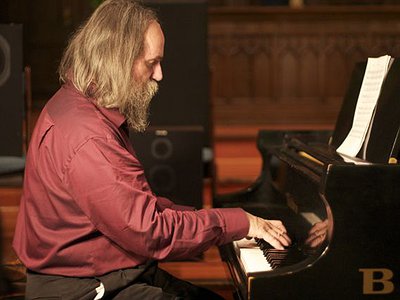How, do you feel, could contemporary compositions reach the attention of a wider audience?
This could happen if music was performed more often in public situations. In the late sixties and seventies there was strong support from the government for arts and culture and so there were a lot of public events. These were situations where people got to hear the music in person and for real. To experience real live music is exhilarating and uplifting. It doesn’t matter what you’re listening to, so long as the musicians are of high quality or are children! It’s these events that spread music.
The real culprit for the reduction of awareness is the lack of funds provided by the government. Without their support, no arts can happen. They used to do it because it was perceived as a valuable thing to do for people but now that has stopped, things may just recede back into a situation like it was two hundred years ago when live music was only available to the wealthy and elite.
We have to provide tonnes of concerts. Not just big venues with one artist either, we need events with lots of different artists. If this can happen our engagement with music will increase dramatically.
The Internet is also important in gaining the attention of a wider audience because it keeps the music alive. If it weren’t for the Internet, music would be dead by now. That said, the Internet does not replace live music and the personal joy gained from the experience of being there. I want people to rediscover the joy of seeing music live.
Go and see more live music!
Music-sharing sites and -blogs as well as a flood of releases in general are presenting both listeners and artists with challenging questions. What's your view on the value of music today? In what way does the abundance of music change our perception of it?
That’s another good question because there is an abundance available online but it’s all just on phonograph. It’s like only looking at art books and never going to a gallery.
If you only read about and listen to music on your computer, that’s OK. It’s better than nothing and I’m grateful for the access it has provided people to my music, but listening to music on computer speakers is nothing like the live experience. You should at least be listening on a decent stereo system.
Experiencing music on the Internet only is like receiving a postcard in the mail. It stimulates your interest and hopefully, like a postcard, it will encourage you to go and investigate the real thing, with your own eyes and ears.
The way I see it, the Internet is great to raise awareness, but we need more live events so that once people’s interest is raised, they can then go and see the real thing.
Composers have traditionally found it hard to secure a living with their art. What are the financial realities you're living with and in which way, do you feel, could they be improved?
I would say that economic hardship is a part of the world for most composers and that’s not a reflection on the quality of their work. I really do not know how I survive because if you look at my yearly income, it’s awfully low but basically, a human being can survive with very little money.
It’s wrong for musicians to place a monetary value on their talents or abilities. Is it right for someone like Pavarotti, who probably had one of the greatest voices in opera ever, to the go and charge more than anyone in the history of opera to see him just because his voice was the best?
I know for fact that there is no pianist in the history of piano playing who could even attempt to perform one of the larger pieces I do. The work is just too damn difficult. Neither their mind nor their fingers could even start to play these big pieces so should I charge more than Rubenstein or some other world famous pianist just because I can do something that they can’t do?
I don’t think that can function but I must admit that no one is likely to offer me that anyway. I’m just speaking hypothetically but in the realm of music that I live in, that way of thinking does not apply. It doesn’t even matter.
Even if I could say I’m not going to perform for less than $20,000 a night because I can do things that no other pianist can do, I wouldn’t. I think that’s wrong. It doesn’t matter that I can do what no other pianist can do. What is important is bringing the beauty and the message of the music, whatever it is, to the people.
Don’t get me wrong, I’d like to earn something from what I do but poverty is not something to be feared. If circumstances dictate that I can’t charge a large fee for what I do, it doesn't matter. I am happy to play anyway. Musicians have to realise that they are more important than money. We have something that other people would die for and that’s the ability to play. There’s a joy in the ability to play an instrument or compose music that you just can’t put a monetary value on. Money must never be the ultimate goal for a musician and for those who it is, I am not interested in listening to their music.
Usually, it is considered that it is the job of the composer to win over an audience. But listening is also an active, rather than just a passive process. How do you see the role of the listener in the musical communication process?
My hope is that the listener will perceive the beauty of the music that I am playing for them. If they feel the beauty of the music the way I feel it, then I am happy. I can’t expect anymore. I know people have other experiences from my music, like metaphysical experiences or whatever, but those things are just little extras, the icing on the cake.
Long ago, when I was starting out, there was no perception at all of what Continuous Music was about and it was very difficult. If the audience feels that the music is beautiful and they love the experience that they have, that’s all I ask.
Please recommend two artists to our readers, which you feel deserve their attention.
The first artist is James Blackshaw, the guitarist. He’s really phenomenal. He’s breaking new ground with his guitar technique so he really stands out for me.
The second artist is Stanley Kubrick, the film director. He deserves to be appreciated because he changed music.
People think that he simply took any old recordings to use in his films but he actually arranged for someone to change the face of the music. He saw the face hidden inside the music and pulled it right out. Holy shit! People think of him as movie director but I think of him as a music director. He does emotionally astounding things with music that tears your soul.
For me as a composer, he was the first person who heard the internal and true face of the composer’s music that he used in his films. He did not use music only as a background to enhance his cinematic message he used the cinema to explain the musical message!
Kubrick showed me that there in fact exists a hidden face within music. A face that is waiting to get out and be seen and understood. I see this face buried behind the stupid glossy performances of classical musicians who miss the point totally of what they are playing, because their hearts are blind to the beauty and suffering of the composer's soul.
He saw and heard this stuff inside, way back inside the music and I am ninety nine percent sure that he was forced to create his own special performances, just like figure skaters have to, by having someone re-orchestrate the pieces of music he wanted to use in order to bring out the drama and passion of the music's face. Handel and Schubert both became glorified by Kubrick's understanding of what their music held inside it, and only Kubrick brought images that cried out in the name of these particular pieces. He created cinema images that make us truly understand what is buried inside these pieces.




